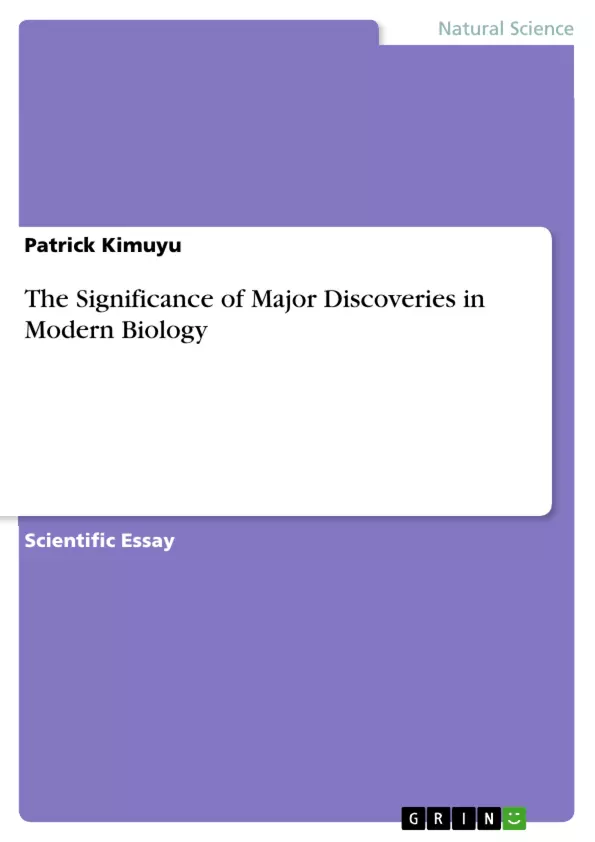This essay will provide an overview on the most important discoveries, which have occurred in the past 50 years and describe their significance to society, health and the culture of modern life.
Biology appears to have undergone a series of evolution since its inception and it has matured into modern biology, which is characterized with an unprecedented sophistication owing to the numerous scientific discoveries that have occurred in the past 200 years. This remarkable growth of the discipline of biology has led to the emergence of new disciplines, and discoveries in DNA, evolution, cell biology and biotechnology are believed to be the principal drivers of scientific progress, especially with regard to biological systems.
However, it is worth noting that the pace of scientific discoveries increased significantly from the mid 20th Century and, it has advanced extensively leading to an appreciable breakthrough in agricultural production, industrial biochemistry, health and medicine. It is also worth noting that some of the discoveries, which have occurred since 1950, formed suitable foundations for advanced discoveries such as the genetic engineering, vaccine development and environmental control.
Table of Contents
- The Significance of Major Discoveries in Modern Biology
- Bacterial Insulin Synthesis
- Gene Therapy Technology
- Somatic Cell Nuclear Transfer (SCNT)
Objectives and Key Themes
This essay aims to provide an overview of the most important discoveries in biology over the past 50 years and describe their significance to society, health and the culture of modern life.
- Impact of major discoveries on human life
- Advancements in health and medicine through biological discoveries
- Social and ethical implications of biological discoveries
- Evolution of biology as a discipline and its diverse applications
- The significance of discoveries in cell biology and genetic engineering
Chapter Summaries
The essay explores several groundbreaking discoveries in modern biology, each with a profound impact on human health and society. One of the most remarkable discoveries discussed is the bacterial synthesis of insulin, which revolutionized the treatment of diabetes. This chapter highlights the importance of this discovery in addressing the global threat of diabetes, which has become one of the leading causes of mortality worldwide.
Another significant discovery examined is gene therapy, which utilizes genetic engineering techniques to correct genetic disorders in humans. This chapter emphasizes the potential of gene therapy to address a range of genetic disorders, particularly those previously lacking effective treatments, such as sickle-cell anemia.
The third chapter focuses on Somatic Cell Nuclear Transfer (SCNT), a technology enabling families to maintain their genealogies through genetic inheritance. The essay discusses the medical and ethical implications of SCNT, highlighting its use in replicating genes of terminally-ill individuals and the controversy surrounding human cloning.
Keywords
The essay delves into key concepts including bacterial insulin synthesis, gene therapy, somatic cell nuclear transfer, genetic engineering, diabetes, genetic disorders, human cloning, and the evolution of biology as a scientific discipline. It explores the impact of these discoveries on human health, society, and the broader culture of modern life.
Frequently Asked Questions
What are the most significant biological discoveries of the last 50 years?
Key discoveries include bacterial insulin synthesis, gene therapy technology, and Somatic Cell Nuclear Transfer (SCNT).
How did bacterial insulin synthesis impact medicine?
It revolutionized the treatment of diabetes by providing a reliable and scalable way to produce human insulin, addressing a leading cause of global mortality.
What is Gene Therapy?
Gene therapy uses genetic engineering to correct or replace faulty genes to treat genetic disorders like sickle-cell anemia.
What is Somatic Cell Nuclear Transfer (SCNT)?
SCNT is a laboratory strategy for creating a viable embryo from a body cell and an egg cell, often associated with cloning and genetic inheritance research.
What ethical concerns are raised by modern biotechnology?
The essay discusses controversies surrounding human cloning, genetic engineering, and the implications of replicating genes of terminally ill individuals.
- Citar trabajo
- Patrick Kimuyu (Autor), 2016, The Significance of Major Discoveries in Modern Biology, Múnich, GRIN Verlag, https://www.grin.com/document/381147



